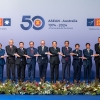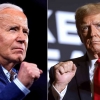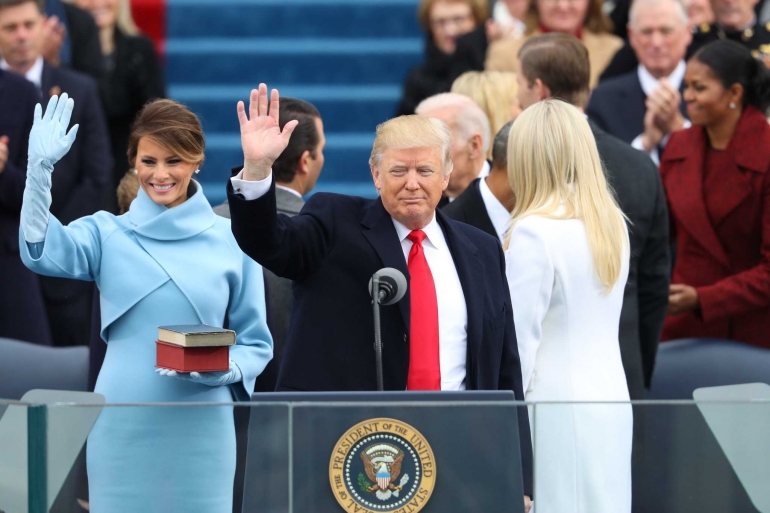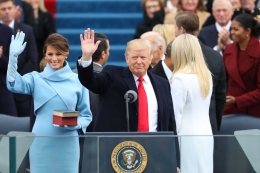Donald John Trump, the current President of the United States was inaugurated on January 2017, succeeded Barack Obama as the previous President. Nevertheless, Trump, as the one who had a contentious background, under the beginning of his presidency, already make statements and even policies that considered as controversial. Trump impact will apply the expansive foreign policy that is very different from its predecessor presidents. Fears after a campaign voiced tones racist, discriminatory, sexist, and xenophobic far from political correctness. Trump's political views would become the world's attention. Especially for third world countries which have bilateral relations.
As an Indonesian, I assume Indonesia, as ASEAN country, will not really be affected by the policies applied by the President of the United States, Donald Trump. Because Indonesia with the U.S. is engaged in the comprehensive and strategic partnership, Indonesia will only be affected indirectly by the policy. But for Asian countries, it will be different. Some experts say, as superpower country, America under Trump's policies will become a big challenge for Asia. As we know, in his 100 days of the presidency, Trump did some controversial foreign policies, like the withdrawal of United States from the Trans-Pacific Partnership (TPP), the imposition of taxes to Mexico, ban Muslim immigration for seven countries, and any others more. The Trump's policies have broad impact for many countries in the world.
In Asia, Trump's policy will take more effect in the People's Republic of China. China as the rival of the United States in economic power will be faced with a major challenge given by Trump. During the three presidential debates, Trump bashed China repeatedly, yet he specified China for the most part in passing, without expounding how he intends to deal with Beijing in the following four years. More importantly, Trump's promise to make America great again could conflict with the great rejuvenation of the Chinese nation. After his inauguration as 45th President of the United States, Trump administration gives an unfriendly statement to China about the South China Sea, Donald Trump government insists the United States will not let China dominate international waters in the South China Sea. If necessary, the US would blockade the territory of China, or meaning "war". Both sides are now involved in the conflict in the related problems in the South China Sea. Washington sees Beijing step in the region as a step expansionism. The U.S. claims, China to disseminate militarization in the region, have been seriously increased the danger of a military confrontation in a region that is strategically important for sea transport. In fact, China repeatedly announced that the South China Sea conflict resolution is feasible without the intervention of Washington. Trump feud with China is not only about the territorial dispute in the South China Sea. Trump several times in the campaign said that China has been stealing American jobs. American also accused China violates human rights and provides support-hidden support to North Korea.
Another important policy that he just inked and influenced ASEAN is the withdrawal of the United States from the Trans-Pacific Partnership. This is a major important inversion of America's position on Asia-Pacific issues. Trump's contention all through the race battle was that the TPP was an awful arrangement for America. As Prashanth (2017) stated TPP withdrawal is unquestionably a major blow to the United States both economically and strategically. Economically, Washington is in effect losing out not just on the potential gains it would get from any free-trade agreement, but also a valuable opportunity to write the rules of 21st century trade in the world's most dynamic and prosperous region, including in areas where it would break new ground like state-owned enterprises and the digital economy. For Asia countries who are the member of TPP agreement, as John Veroneau (2017) said the Trump administration could still pursue bilateral deals with individual countries, particularly Japan and Vietnam, that mirror the deals negotiated under the TPP. Jennifer Ammur (2017) thought without the U.S. asserting its leadership in Asia, China is poised to expand its influence. It will give an advantage and opportunities for China to spread their economy in the region also to increase their leverage in global affairs, seizing on America's turn inward.
For developing country in ASEAN such as Malaysia, Indonesia, Vietnam and Thailand, the Trump's policy more affected because of Trump economic policy, it is relatively unfriendly to the ASEAN countries. His victory is likely to be bad for the economy in Asian countries. In fact, after the news of the election of Donald Trump, the global financial markets directly free-fall. And not only that, apparently also had an impact on the currency in those countries. Furthermore, the economies of export-driven of Malaysia, Singapore, Thailand and Vietnam would be affected under US President elect Donald Trump's day of work towards lower levels of US imports and foreign direct investment (FDI). Moody's Investors Service (2017) said these four nations confront unfriendly outcomes, given that worldwide fares represent half 150% of these nations' GDP.
However, as the President who newly inaugurated just 7 months ago, the policy of Donald Trump cannot be predicted. Under the "America First" banner, he will put his interest with his controversial ideas to make "America great again". As stated by Joseph Chinyong (2017), for us in Asia, Trump's presidential such frustrations that bedevil the American electorate should not be allowed to dominate discussion on the possible shape of the Trump administration's foreign policy in our region.
*References from various sources










